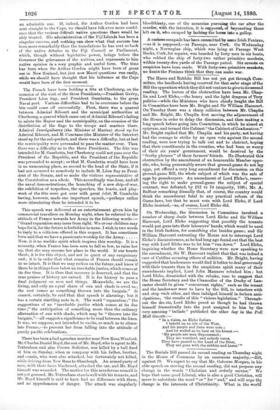This speech was delivered at an entertainment given him by
commercial travellers on Monday night, when he referred to the attitude of France towards her Army in the following words :- "Grand reparation may issue from right. W e or our children may hope for it, for the future is forbidden to none. I wish in two words to reply to a criticism offered in this respect. It has sometimes
been said that we have a passionate worship for the Army Now, it is no warlike spirit which inspires this worship. It is a necessity, when France has been seen to fall so low, to raise her up, that she may resume her place in the world. If our hearts throb, it is for this object, and not in quest of any sanguinary end ; it is in order that what remains of France should remain to us intact. It is that we may reckon on the future, and know if there be in things here below an inevitable justice, which comes at its due time. It is thus that recovery is deserved, and that the true praises of history are earned. It is for history to pass a final judgment on men and things. Meanwhile, we are the living, and only an equal share of sun and shade is owed us ; the rest comes as something thrown into the bargain." It cannot, certainly, be said that that speech is alarming; but it has a certain startling note in it. The word " reparation ;" the suggestions of an "inevitable justice which comes at its due time ;" the anticipation of something more than the ordinary alternation of sun with shade, which may be "thrown into the bargain,"—all suggest a significance to be read between the lines. It was, we suppose, not intended to excite, so much as to stimu- late France,—to prevent her from falling into the attitude of purely pacific celebrations.






























 Previous page
Previous page